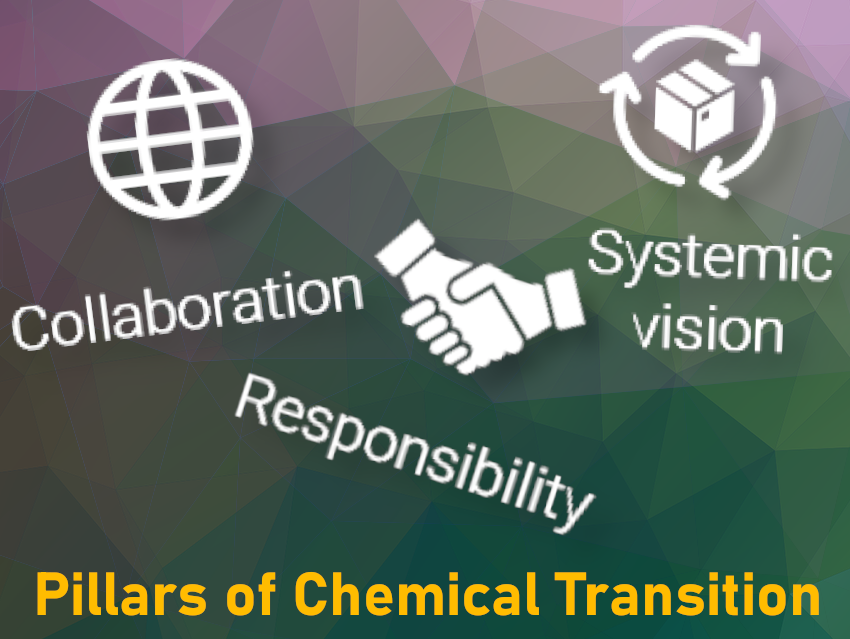It is crucial to address environmental, industrial, and societal concerns through a systemic approach to meet the challenges of ecological transition. Because chemistry has a significant impact on our daily necessities such as food, technology, and medicine, sustainable chemistry is key to combating climate change, biodiversity loss, ecosystem pollution, and promoting equitable access to resources and societal well-being. Therefore, the transition to greener products relies heavily on sustainable chemistry. Ultimately, all strategies for environmental transition rely on sustainable chemistry; without it, environmental transition remains unachievable. However, the important rule of chemistry is often underestimated or even absent in the transition strategies of companies and public players, which focus mainly, if not solely, on decarbonization.
Since 2012, a group including Veolia has been working on the Chemical Transition concept. It’s about recognizing that chemistry’s role in these changes is greater than we think. There is an urgent need to create a framework to support the chemical industry’s transition, both at an industrial and societal level. Just as the international community reached an agreement to tackle climate change with the signing of the Paris Agreement in 2015, which defined a precise strategy and action plan, the Chemical Transition must be addressed with the same strength and levers.
The 5th International Conference on Chemicals Management (ICCM5) held in September 2023 in Bonn, Germany, organized by SAICM (Strategic Approach to International Chemicals Management) and UNEP (United Nations Environment Programme), brought together diverse stakeholders to develop an agreement defining a new global framework for improved chemicals management. This framework, “Global Framework on Chemicals” (GFC), based on 28 goals, aims to provide each country with a roadmap that emphasizes a sustainable and safer chemical life cycle, promotes existing initiatives, and unites the chemical sector around clear, ambitious, and positive goals. These are important considerations and first steps toward ecological transformation in the chemical sector, but they are still work in progress and feedback is welcome.
As part of a first contribution to the Bonn Agreement, more than 40 participants, including chemists, major industries, NGOs, financial institutions, public authorities, scientists and youth, discussed the best ways to implement the Chemical Transition. These are important considerations and first steps toward ecological transformation in the chemical sector and for all the chemical cycle, but they are still work in progress and feedback is welcome.
Practical recommendations for implementing the Chemical Transition include: Restrict or avoid using highly toxic chemicals, aligning with the EU Green New Deal’s ‘Sustainable Chemicals Strategy. Enhance the planetary limits model by integrating the SPC model focusing on the chemical cycle. Evaluate Chemical Transition progress through global financial and environmental indicators, considering impacts across the chemical value chain (e.g., emissions, health risks, resource scarcity, waste, biodiversity).
A proposal to implement the Chemical Transition involves the following:
- Adopt a comprehensive vision for the chemical industry considering environmental and societal challenges across the entire chemical cycle, moving beyond narrow focuses like decarbonization or biodiversity.
- Embrace a long-term approach to Chemical Transition, balancing short, medium, and long-term impacts while acknowledging market dynamics.
- Develop a shared definition of Chemical Transition for a unified economic and social shift, facilitating consistent communication among industry players.
- Clearly outline actionable pathways to support this vision using available resources. Explain in simple terms.
- Unify and engage all participants in the chemical value chain.
- Reconsider business models and establish universal metrics for measuring impacts within the chemical sector.
- The Chemical Transition – A comprehensive proposal to accelerate the industrial and ecological transitions (Collaborative note),
Ismahane Remonnay (Veolia), Roxane Bibard (SoScience), Floriane Benichou (Attali Associates),
December 2023.
Link: Veolia-Note-TC-EN-13.12.2023-AA (PDF)
Also of Interest
- UNEP welcomes new Global Framework on Chemicals, UNEP September 30, 2023. (accessed January 3, 2024)




